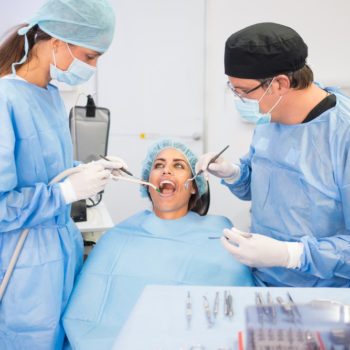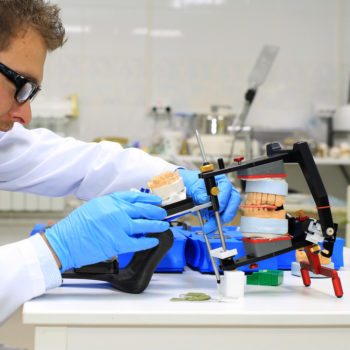Why We Love It
-
$172,350Potential Avg. Salary
-
18.1%Job Growth Rate
-
Growing DemandJob Outlook
-
Dependable Daily WorkloadCareer Attribute
Dentists promote and enable proper oral health. Through oral examinations and x-ray technology, dentists identify and treat issues like cavities and gum disease. They also educate patients on oral health best practices and may prescribe toothpastes and mouthwashes that strengthen teeth or repair gums.
Recommended Schools
What is a Dentist?
The following job responsibilities are common for individuals in dentist roles:
- Perform examinations and review x-rays to identify and diagnose oral health problems
- Remove cavities using drills and other tools, and install fillings
- Administer anesthetics to patients to numb areas where work will be performed
- Educate patients on best practices for good oral hygiene
- Refer patients to oral surgeons, endodontists, and orthodontists when necessary
A Day in the Life
Staff at a dentist’s office usually includes at least one receptionist, one dental hygienist, one dental assistant, and one dentist. The dentist works alongside all of these staff members to provide oral care to patients. When a patient comes in for a routine cleaning, he/she usually sees the dental hygienist first. The dental hygienist cleans the patient’s teeth and takes x-rays if needed. The dentist usually does not see a patient until after his/her teeth has been cleaned.
After the cleaning, the dentist performs an oral examination of the patient and reviews x-rays to identify and diagnose problems like cavities and gum disease. Once the examination is complete, the dentist will explain any issues discovered to the patient and recommend treatment if necessary. The recommended treatment may be returning to the dentist’s office for cavity removal or other repair, or the dentist may prescribe a fluoride toothpaste or special mouthwash for strengthening teeth or cleaning gums.
The dentist also works with his/her assistant to remove cavities, replace holes in teeth with filings, and repair issues like cracked teeth. Additionally, dentists and their assistants may install crowns or bridges. Some dentists may also be able to extract teeth, perform root canals, and install implants, though additionally schooling is required to perform these procedures. Instead, of going through additional training, some dentists refer patients to specialists when the treatment needed requires special care.
Typical Work Schedule
Dentists usually set their own work schedule particularly in private clinics where 90% of the dentists work. On average, full time dentists work for 36 hours per week including 33 hours of treating patients and 3 hours for administrative and preparation time. Some dentists follow the regular 40-50 hours working schedule whether in medical centers or hospitals. Some dentists may allow the option to set exceptional appointments in the evenings or weekends to accommodate patients who have strict schedule. Dentists are also expected to participate in training workshops or conferences that present new materials and techniques available in the field.
Projected Job Growth
Dentists are expected to continue being in high demand as the population ages. According to the US Bureau of Labor Statistics, the employment of dentists is expected to increase by at least 3 % from 2019 to 2029 which is about the same as the average for other occupations. Specific areas and specialties will be in higher demand especially those related to promoting good oral hygiene as recent research shows its link to overall health. As the population ages with more of them keeping their teeth unlike previous generations, more problems will arise that requires complicated dental services. Such problems include increased risk of oral cancer which requires advanced dental skills for reconstruction. It is expected that the job market for dentists gets more intense competition as the number of graduates is increasing. Accordingly, you will need to have knowledge about new and more efficient techniques that can give an edge over your peers.
Typical employers
Most of the dentists work in private clinics which can be a clinic completely owned by single dentist or a center shared by a group. They can also work in medical care centers and hospitals. Working in private clinics is usually more rewarding but it requires more patience, effort and dedication to build your reputation and network of clients. You will also be responsible for other logistic matters including hiring of assistants, administrative staff and procurement of materials and equipment. Some dentists may choose to work in insurance companies to evaluate claims related to dentistry.
Dentist Specializations
Most dentists are general practitioners that perform many tasks that lead to oral health, but some dentists choose to specialize in a specific treatment area:
- Endodontists are dentists that specialize in performing root canal procedures.
- Orthodontists specialize in the installation, adjustment, and maintenance of braces.
- Oral surgeons perform surgeries—such as tooth extractions—that may require patients to be sedated during procedures.
- Pediatric dentists specialize in treating infants, young children, and adolescent patients
Typical Employers
Most dentists work for themselves, either in an individual or group practice. Dentists who work in a group practice usually share space—and potentially office personnel—with other dentists in their group. However, some dentists are also able to find work in hospitals, and some are employed by dental franchise corporations.
Recommended Schools
How To Become a Dentist
The minimum requirement for working as a general dentist is a graduate degree from one of three programs: Doctor of Dental Surgery (DDS), Doctor of Dental Medicine (DDM), or Doctor of Medical Dentistry (DMD). To be admitted into a graduate dentist program, students must have a bachelor’s degree. The bachelor’s degree a student earns can be from any field of study, though those with degrees focused on science may have a better chance of being admitted.
In addition to holding a DDS, DDM, or DMD degree, most general dentists must be licensed to work as dentists in their state. Getting licensed typically requires prospective dentists to pass written and practical exams administered by the Joint Commission on National Dental Examinations (JCNDE). However, each state has its own requirements, so aspiring dentists should review all licensing requirements in the state(s) they want to practice in to be sure all requirements are met.
Dentists that want to perform more specialized procedures—like root canals, oral surgeries, or orthodontics—must obtain additional certifications after earning a general dentistry degree. The process of being certified to perform specialized procedures usually entails completing a 2- or 4-year residency in that specialty, and may require passing additional written and practical examinations in order to become licensed in their states for those specialties.
Dentist Salary Data
We’ve provided you the following to learn more about this career. The salary and growth data on this page comes from recently published Bureau of Labor Statistics data while the recommendations and editorial content are based on our research.
National Anual Salary
Low Range
$109,030Average
$172,350High Range
---National Hourly Wage
Low Range
$52/hrAverage
$83/hrHigh Range
---How do Dentist salaries stack up to other jobs across the country? Based on the latest jobs data nationwide, Dentist's can make an average annual salary of $172,350, or $83 per hour. On the lower end, they can make $109,030 or $52 per hour, perhaps when just starting out or based on the state you live in.
Salary Rankings And Facts
#12 Nationally for All Careers
Above Average Salary Nationally
Programs and Degrees
Here are the most common degrees for becoming a Dentist. a is usually recommended and specifically a degree or coursework that prepares you for the particular field, see below.
Highest Education Among Dentists
- 95.5% Doctorate
- 2.1% Masters
- 1.7% Bachelors
- 0.3% Associates
- 0% College
- 0.3% High School
- 0.2% Less than High School
Job Growth Projections and Forecast
2014 Total Jobs
129,0002024 Est. Jobs
152,300Job Growth Rate
18.1%Est. New Jobs
23,300How does Dentist job growth stack up to other jobs across the country? By 2024, there will be a change of 23,300 jobs for a total of 152,300 people employed in the career nationwide. This is a 18.1% change in growth over the next ten years, giving the career a growth rate nationwide of Above Average.
Growth Rankings And Facts
#71 Nationally for All Careers
Above Avg. Growth Nationally
What Companies Employ The Most Dentists
| Industry | Current Jobs | New Jobs Needed | % Increase |
|---|---|---|---|
| Offices of dentists | 89,200 | 16,700 | 17% |
| Self-employed workers | 29,800 | 4,400 | 4% |
| Offices of physicians | 2,800 | 600 | 1% |














